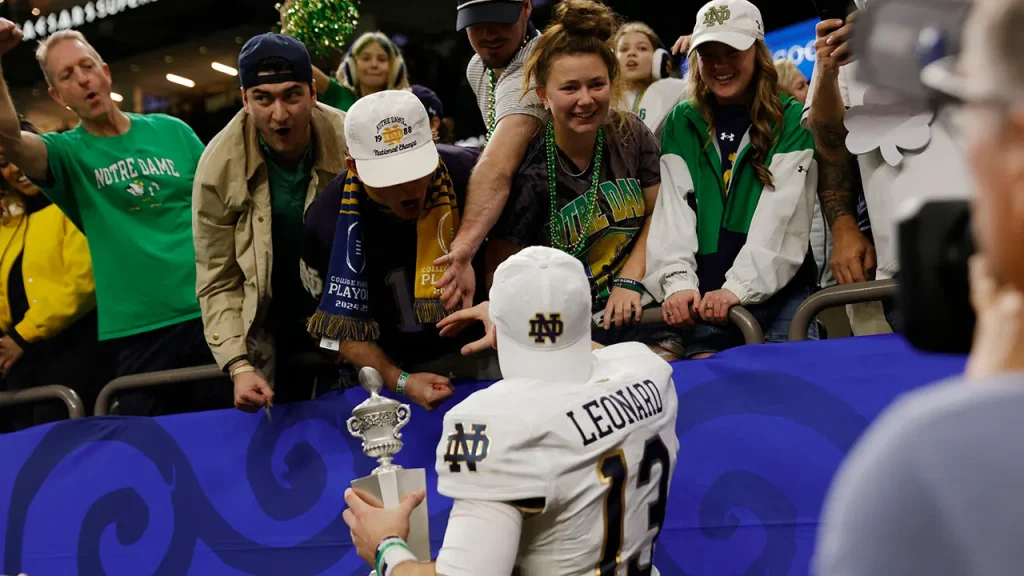The Allstate Sugar Bowl, a pivotal college football playoff game, proceeded in New Orleans just 36 hours after a chilling terrorist attack shook the city. In the predawn hours of New Year’s Day, a horrific scene unfolded in the French Quarter as Shamsud-Din Jabbar, a 42-year-old U.S. citizen, allegedly plowed a white pickup truck into a crowd of revelers, leaving a trail of devastation. At least 15 lives were tragically cut short, and dozens more suffered injuries in the attack. The incident cast a long shadow over the upcoming Sugar Bowl, scheduled to take place a mere couple of miles from the site of the tragedy.
The game, originally slated for Wednesday night, was postponed to Thursday afternoon, allowing time for the city to grapple with the shock and grief. Despite the lingering anxiety and uncertainty, the Caesars Superdome filled with fans eager to witness the clash between Notre Dame and Georgia. The atmosphere was undoubtedly tinged with solemnity, but the spirit of competition and the resilience of the city shone through. For a period, the future of the game hung in the balance, with questions surrounding not only the timing but also the potential relocation of the event. However, the decision was made to proceed as planned, albeit with significantly heightened security measures in place.
The game unfolded without incident, a testament to the combined efforts of law enforcement and event organizers. Notre Dame emerged victorious, defeating Georgia with a final score of 23-10, securing their advancement in the College Football Playoff. Amid the triumph, the weight of the recent tragedy remained palpable. Notre Dame quarterback Riley Leonard, named the Offensive Player of the Game, acknowledged the somber backdrop in his post-game remarks. He expressed gratitude for the unwavering support of the Fighting Irish fans, who turned out in force despite the unsettling circumstances. Leonard recognized the difficulty of the week and extended thoughts and prayers to the families impacted by the attack.
The pre-game ceremonies served as a poignant tribute to the victims. A moment of silence was observed, allowing for reflection and remembrance. Following the national anthem, a resounding chant of “USA” echoed through the stadium, a powerful expression of unity and resilience in the face of adversity. The attack, perpetrated by Jabbar, carried a chilling hallmark of terrorism. His truck, adorned with an ISIS flag, served as a grim symbol of his allegiance. The ensuing shootout with police resulted in Jabbar’s death at the scene.
The details surrounding Jabbar’s background and motives painted a complex picture. A U.S. Army veteran, he had reportedly held a lucrative six-figure job. His actions, however, revealed a descent into extremism. The rented Ford pickup truck he used in the attack was not merely a vehicle but a weapon, loaded with firearms and a potential improvised explosive device (IED). Authorities later discovered additional potential IEDs in the French Quarter, highlighting the planned nature of the attack and the potential for even greater devastation.
The attack served as a stark reminder of the ever-present threat of terrorism and the vulnerability of even seemingly secure environments. The resilience of the city of New Orleans, however, was equally evident. In the wake of tragedy, the community rallied together, determined to carry on with the cherished traditions that define the city’s vibrant spirit. The Allstate Sugar Bowl, proceeding as planned, became a symbol of this resilience, a testament to the power of community and the enduring human spirit in the face of adversity. The game, while a sporting event, transcended its usual significance, becoming a symbol of defiance, hope, and the determination to move forward in the aftermath of tragedy.

